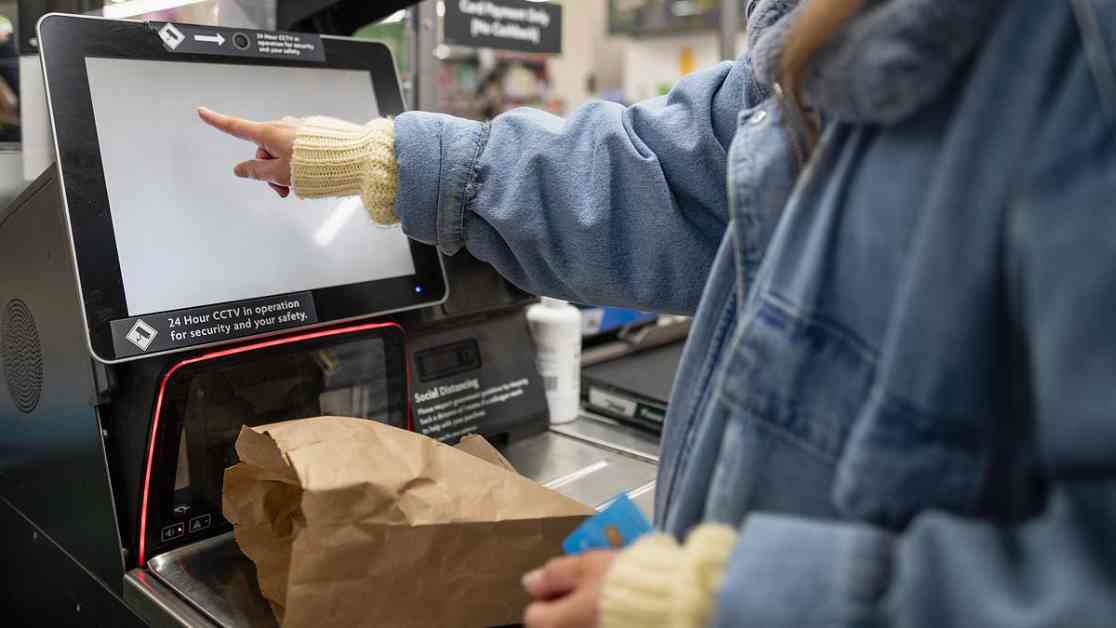Shoplifting has taken on a new form in the digital age, with self-service checkouts becoming a popular tool for a new breed of shoplifters. A recent survey by The Grocer magazine found that more than 30% of shoppers in the UK admit to using self-checkout machines to steal from stores. The survey revealed that a significant number of customers confessed to not scanning items or deliberately weighing loose items incorrectly to avoid paying the full price. This trend has raised concerns among criminology experts and retail chiefs who fear that self-service tills are creating opportunities for theft that were previously not as prevalent.
The Rise of Middle-Class Shoplifters
In recent years, a new category of shoplifters has emerged, often referred to as “middle-class shoplifters.” These individuals, perceived as more affluent and entitled, have been exploiting self-service checkouts to steal from stores. According to Matt Hopkins, an associate professor in criminology at the University of Leicester, self-scan and self-checkout machines have created a new breed of shoplifters by providing opportunities that were not previously available. The convenience and anonymity of self-service tills have made it easier for individuals to justify their actions and engage in shoplifting.
Archie Norman, chairman of Marks & Spencer, has openly criticized middle-class shoplifters, attributing their behavior to frustrations with self-service tills. Norman believes that the occasional technical issues with these machines, such as the infamous “unexpected item in the bagging area,” have led some shoppers to rationalize stealing as a response to inconvenience. The rise of self-scan technology in supermarkets has only exacerbated this issue, with retailers investing millions in these systems to cut costs.
Supermarkets’ Response to Shoplifting Concerns
Despite the convenience of self-service checkouts, supermarkets are facing a growing problem of theft and shoplifting. Retailers have implemented various security measures, such as body-worn cameras and anti-theft devices, to combat this issue. However, the rise in shoplifting incidents has prompted some supermarkets to reconsider their reliance on self-checkout machines.
Some stores, like Asda, have committed to increasing staff on manned tills or even eliminating self-service checkouts altogether in response to customer backlash. Morrisons’ chief executive, Rami Baitiéh, acknowledged that the company may have gone too far in rolling out self-scanning technology. Despite these challenges, a survey conducted by The Grocer revealed that the majority of Brits prefer using self-service machines over manned tills due to their speed and convenience.
The Impact on Small Businesses
The prevalence of middle-class shoplifters has taken a toll on small, independent businesses that lack the resources to combat theft effectively. Shop owners across the UK have reported incidents of theft by seemingly affluent individuals who exploit the self-scan technology to steal high-end goods. The rise in shoplifting has cost these businesses significant financial losses, with one shop manager claiming that his store loses £900,000 annually due to theft.
The Human Side of Shoplifting
The human impact of shoplifting extends beyond financial losses, with shop owners expressing frustration and disappointment at the brazen behavior of middle-class shoplifters. Many store owners have shared stories of theft incidents involving well-to-do individuals who exploit their wealth and privilege to justify stealing from stores. The Consumer Action Group, a support forum for shoplifters, has seen an influx of members sharing their experiences and concerns about being caught stealing from retail outlets.
In conclusion, the rise of middle-class shoplifters and the exploitation of self-service checkouts highlight the evolving nature of theft in modern society. As retailers and law enforcement agencies grapple with this issue, it is essential to address the root causes of shoplifting and implement strategies to prevent further losses. By raising awareness and promoting ethical behavior, we can work together to create a safer and more secure shopping environment for all.






















